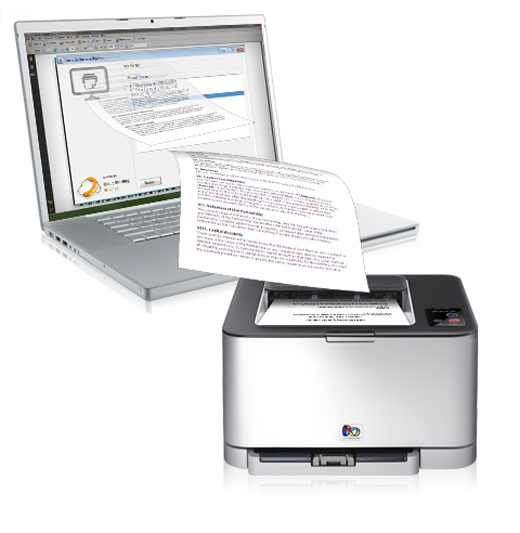According to a recent study by IDC, 70% of companies have no overview of their printing costs. However, printing is an area with impressive cost-saving potential. According to IDC, a cost reduction of 30% is achievable with the right print management. And depending on the industry, three to six percent of a company's turnover is spent on printing. It not only makes financial sense, but is actually worth your while to take a closer look at printing in your company and the accrued cost. One approach to gaining an overview of companywide printing costs is through managed print services (MPS). IDC forecasts that increasing demand for MPS will result in the European market growing to 4 billion by 2014.

What actually are managed print services?
In general, opinions vary, however, MPS is the term used to describe the outsourcing of print infrastructure. Until now, printer manufacturers offering their customers what could be best described as 'all-inclusive' packages have dominated the market. Their services for print infrastructure are offered either through their own technicians or via system houses. Many MPS concepts are based on a pay per page concept, i.e. the customer pays per printed page in addition to a fixed fee. Support ranges from an analysis of the print infrastructure, to setup and maintenance of equipment, as well as the supply of consumables.
An important feature of manufacturer-based MPS solutions is that only printers from that specific manufacturer can be used. Existing infrastructure, such as printers from other manufacturers, are not included in the environment. For many companies particularly for small and medium-sized enterprises this is a rather unrealistic and also an extremely expensive and wasteful approach. The channel therefore finds it hard to generate revenue with this approach to smaller organizations. The result is that the cost and environmental potentials that could be gained with MPS remain underutilized by a vast number of companies.
Cortado (formerly ThinPrint) takes a different approach. The company, renowned for its print management and mobile business software products, offers an innovative solution with its Printer Dashboard service. The solution is located entirely in the cloud, the basic version is free of charge, and most importantly it is manufacturer independent. Printer Dashboard allows resellers to develop their own MPS concept for existing and new customers. Resellers can remotely manage their customers' print environments, as well as receive updates on costs, printing trends as well as error, maintenance and support messages that can be acted upon before more serious problems occur. Cortado enables resellers to easily create attractive MPS concepts for existing and new customers. Resellers can enjoy complete freedom when designing service contracts. Manufacturers as well as service partners can easily expand or reduce the number of devices to be monitored without long-term contractual commitments. The entry threshold is very low, making MPS solutions attractive even for small businesses.
Aspects companies should watch out for when choosing MPS
The first essential step within a MPS concept framework is an analysis of the actual current situation. Weak points must be recognized; the company's desires and goals must be taken into account and users' requirements evaluated.
One important component is an analysis of existing devices and their utilization. A qualitative analysis, describing what format, color, or what kind of documents are printed is as important as a quantitative analysis. Existing workflows should be critically examined, such as whether or not certain printouts can be replaced by a digital version, e.g. a PDF.
Oliver Jendro, from MPS experts Dokulife, points out that a successful MPS concept includes hardware and software from third-party manufacturers. According to Jendro, the existing print infrastructure in most companies is heterogeneous. Some devices are bought, some leased and all from a variety of manufacturers. The output specialist notes that only such an open approach means that older or specific devices can continue to be used.
Finally, the ultimate part of a MPS contract is the procurement and delivery of consumables such as paper and toner. For resellers deciding to enter the MPS business, proximity to customers or an extensive service network is important. How else can toner and paper be delivered? And it goes without saying that the relevant expertise in the printing area is a prerequisite.
MPS offer companies the possibility to reduce their costs, and offer resellers the chance to expand their business and customers base. After all, smoothly-running, cost-efficient printing is at the heart of every capable IT infrastructure.

Add a Comment
No messages on this article yet